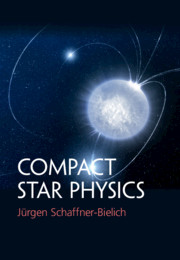10 - Gravitational Waves
Published online by Cambridge University Press: 17 August 2020
Summary
The detection of gravitational waves from the merger of black holes and the merger of two neutron stars are discussed. The linearized theory of general relativity is introduced. The concept of the gauge invariance is put forward and the transverse-traceless gauge for gravitational waves is presented. Einstein‘s famous quadrupole formula for gravitational waves is developed. The principle of detecting gravitational waves is outlined. As applications, the emission of gravitational waves from a nonvanishing ellipticity of rotating neutron stars is derived. The chirp mass is introduced and the emission of gravitational waves from compact binary systems is obtained. The formula for the tidal deformability and the Love number is put forward and discussed with regard to the recent measurement of a neutron star merger by the LIGO–Virgo scientific collaboration.
Keywords
- Type
- Chapter
- Information
- Compact Star Physics , pp. 264 - 294Publisher: Cambridge University PressPrint publication year: 2020

